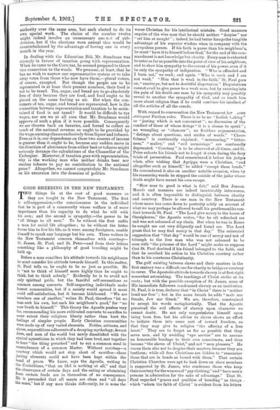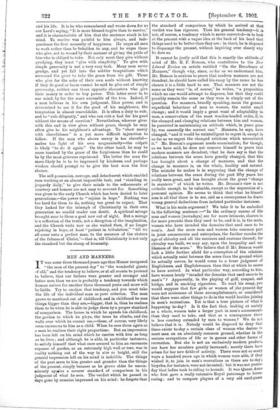GOOD BREEDING IN THE NEW TESTAMENT. T WO things lie at
the root of good manners as they are taught in the New Testament. The first is self-suppression,—the consciousness in the individual that he is part of a community whose welfare is of more importance than his capacity to do what he will with his own; and the second is sympathy,—the power to be " all things to all men." To be without the first unfits a man for social life altogether ; to be without the latter forces him to live his life, as it were, among foreigners, unable himself to speak any language but his own. Three writers in the New Testament concern themselves with courtesy— St. James, St. Paul, and St. Peter—and from their letters something like a philosophy of good breeding might be built up.
Before a man considers his attitude towards his neighbours be must consider his attitude towards himself. In this matter, St. Paul tells us, he ought to be as just as possible. He is "not to think of himself more highly than he ought to think, but to think soberly." Evidently he is to avoid not only spiritual pride, but the fanciful self-accusations so common among converts. Self-respecting individuals make honest communities, but if a society would spread it must avoid self-satisfaction, lest it become hidebound. " We are members one of another," writes St. Paul, therefore "let no man seek his own, but each his neighbour's good," for " no man liveth to himself." This theory the Apostle pushes very far, recommending his more cultivated converts to sacrifice to some extent their religious liberty rather than hurt the feelings of simpler people. Early Christian communities were made up of very varied elements. Nobles, artisans, and slaves, superstitious adherents of a decaying mythology, devout Jews, and men of the world but newly dissatisfied with the cynical agnosticism in which they had been bred, met together to hear " the thing preached " and to eat a common meal in remembrance of a common Master. Without courtesy—a courtesy which would not stop short of sacrifice—these Jarring elements could not have been kept within the bond of peace. We know, says the Apostle, writing to the Corinthians, "that an idol is nothing at all," and that the observance of certain days and the eating or abstaining from certain foods are in themselves of no consequence. He is persuaded that all meats are clean and "all days the same," but if any man thinks differently, he is none the worse Christian for his intellectual mistake. • Good manners require of the wise man that be should neither " despise " nor " set him at naught " ; indeed, he bad better forego the tangible advantage of his superior wisdom when in company with the scrupulous person. If his faith is purer than his neighbour's, he must" have it to himself before God," for the end of the com- mandment is not knowledge but charity. Every man is exhorted to enter as far as possible into the point of view of his neighbour, and to show him sympathy to the extent of his power, even if it be only the sympathy of indignation. " Who is offended and I burn not," we read ; and again, " Who is weak and I um not weak." "Him that is weak in the faith," St. Paul goes on," receive ye, but not to doubtful disputation." Disputations cannot avail to give peace to a weak man, but by entering into the pain of his doubt one man by his sympathy may possibly reveal to another the sympathy of God, and so teach him more about religion than if he could convince his intellect of. all the articles of all the creeds.
With regard to conversation the New Testament lay -town stringent Puritan rules. There is to be no "foolish 1..tking " or " jesting which is not convenient " ; no discussion of the conduct of those of whose doings " it is a shame to speak " ; no wrangling or " clamour "; no fruitless argumentation, " dotings about questions, and strifes of words." " Cheer- fulness" is continually enjoined ; " murmuring," " bitter- ness," "malice," and "evil surmisings " are continually deprecated. " Courtesy " is to be observed at all times, and St. Peter exhorts his friends not to forget it even during the fiery trials of persecution. Paul remembered it before his judges when, after wishing that Agrippa were a Christian, "and altogether such as himself," he added "except these bonds." He remembered it also on another notable occasion, when by his reassuring words he stopped the suicide of the jailor whose death might have meant his own escape.
"How near to good is what is fair," said Ben Jonson. Morals and manners are indeed inextricably interwoven, and it is often impossible to distinguish between charity and courtesy. There is . one man in the New Testament whose name has come down to posterity solely on account of what we may perhaps be allowed to call his gentlemanlike con- duct towards St. PauL " The Lord give mercy to the house of Onesiphorus," the Apostle writes, "for he oft refreshed me and was not ashamed of my chain. But when he was in Rome be sought me out very diligently and found me. The Lord grant that he may find mercy in that day." The reiterated suggestion that "that day" would be one of mercy and not of triumph to the free man who was not ashamed to be seen with "the prisoner of the Lord" might make us suppose that St. Paul doubted if his friend belonged to the faith, and that he ascribed his action to his Christian courtesy rather than to his courteous Christianity.
The gulf existing between slaves and their masters in the first century was a difficult one for charity to bridge or courtesy to cover. The Apostolic attitude towards slavery is at first sight somewhat astonishing. The teachings of Christ strike at its roots; but with the possible exception of St. James, none of His immediate followers condemned slavery as an institution. St. Paul, it is true, declares that "in Christ" there is "neither bond nor free" ; but in the same breath he adds " male nor female, Jew nor Greek." We are, therefore, constrained to accept his words metaphorically. That the Apostle perceived the evil effects of slavery upon character we cannot doubt. He not only congratulates himself upon being born free, but his advice to slaves shows an effort to initiate them into some sort of inward freedom, so that they may give to religion " the offering of a free heart." They are to forget as far as possible that they serve men, and by avoiding "eye service" are to assume an honourable bondage to their own consciences, and thi, become "the slaves of Christ," and not " men pleasers." He warns them also not to despise their masters, because they are brethren; while all free Christians are bidden to "remember those that are in bonds as bound with them." That certain Christian Churches were apt to look down on slave members is suggested by St. James, who condemns those who keep their courtesy for the wearers of " gay clothing," and" have men's persons in admiration for the sake of advantage." That St. . Paul regarded "graces and qualities of breeding" as things , which "adorn the faith of Christ" is evident from his lettere
and his life. It is he who remembered and wrote down for us our Lord's saying, "It is more blessed to give than to receive," and it is characteristic of him that the sentence stuck in his mind. To receive was painful to him always, and inde- pendence the first necessity of happiness. He urges all men to work rather than be beholden to any, and he urges those who give, not to wound by their manner of giving the pride of him who is obliged to take. Not only must they give without grudging, they must " give with simplicity." To give with simple generosity is not a very easy task. Many men never grudge, and yet fall into the subtler temptations which surround the giver to take the grace from his gift. Those who give for the sake of their own souls without knowing if they do good or harm cannot be said to give out of simple generosity, neither can those opposite characters who give their money in order to buy power. This latter error is, to our mind, by far the more excusable of the two. Indeed, if a man believes in his own judgment, likes power, and is determined to use it for the good of his neighbours, the temptation is almost unavoidable. It is often a duty to rule, and to "rule diligently," and who can rule a fool for his good without the means of coercion? Nevertheless, whoever gives with this end in view gives without grace, though he may often give to his neighbour's advantage. To "show mercy with cheerfulness " is a yet more difficult injunction to follow. If the man who shows mercy is too cheerful— makes too light of his own magnanimity—the culprit is likely "to do it again." On the other hand, he may be more touched by the grace of the forgiveness than he could be by the most grievous reprimand. The better the man the more likely he is to be impressed by kindness, and perhaps wisdom should prompt us to give the best man the first chance.
The self-possession, courage, and detachment which enabled men working at an almost impossible task, and " standing in jeopardy daily," to give their minds to the refinements of courtesy and honour are not easy to account for. Something was given to the early Church which has been denied to later generations,—the power to " rejoice in hope." Nothing was too hard for them to do, nothing too great to expect. That they looked for the triumph of Christianity in their own generation no candid reader can doubt. A spiritual mirage brought near to them a goal now out of sight. But a mirage is a reflection of the truth, not a deception of the imagination, and the Church waits now as she waited then, if no longer rejoicing in hope, at least " patient in tribulation," " till we all come unto a perfect man, to the measure of the stature of the fulness of Christ,"—that is, till Christianity is not only the standard but the stamp of humanity.







































 Previous page
Previous page